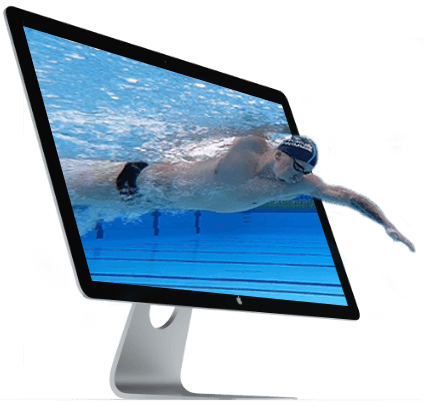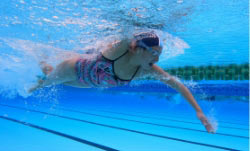Great swimming technique doesn’t come naturally to most people. Most people are doing the incorrect thing because they haven’t been taught how to achieve great swimming technique. Do you feel like you’re trying much harder than you should be? Do you ever find yourself exhausted after only a few laps? Does it feel like you’re fighting against the water?
Here are 3 important tips to remember when it comes to achieving excellent swimming technique which will help you break those bad habits once and for all:
1. Keep your body long – Swimming technique must always be kept long, with the swimmer extending their arms, head and shoulders forward while keeping their legs, feet and hips streamlined behind them. The longer your body is kept throughout the stroke, the faster your body will travel through the water. Picture your body as a thin, long yacht gliding through the water and not a big, wide barge which uses enormous amounts of energy to move forward.
2. Treat the water as your friend, don’t fight it – Often swimmers will thrash about in the water in an attempt to pull themselves through it at all costs. They will be splashing, kicking and fighting against the water in an effort to go faster. Good swimmers will use the water as their friend by allowing the natural buoyancy of their body in the water to sit high and streamlined in the water. Rather than pulling hard against the water, power in swimming comes from smooth and efficient movements.
3. Relax your muscles, relax your breathing – A tense swimmer is like a broomstick trying to bend. The key to great swimming technique to be able to relax both your muscles and your breathing. Our body’s natural instinct is to tense up our muscles to pull and kick faster, but in reality this slows us down. Unfortunately this is what slows a swimmer down in the water. Relax and let your body glide through the water for efficient and effective swimming. And it’s a whole lot easier once you get it right!
Swimming with great technique shouldn’t be a struggle. Reduce your frontal resistance by keeping the body long and streamlined like a torpedo throughout the stroke. Work with the water by using it’s buoyancy to your advantage and most importantly relax to go faster, don’t tense up. Follow these simple tips and you will be well on your way to swimming with excellent technique



Want to know about latest advance techinique.
Thanks for your advice. It sounds very logical and it makes sense. I will strongly consider it. Thanks again.
It’s really interesting to read your tips on better, faster swimming. I love water and swimming. Although I can swim well, I like to improve to be even better.
your tips is very important and i feel that you are agood swimmer and agood writer
i am sorry let me introduce my self
me mohammd
swimming coach from egypt
nice to speak to you
I am gaining a lot from studying your videos and following your advice. I’m still not able to find a ‘good’ coach for advice here, but ask my husband frequently to watch me – however, that’s not productive as he remains in awe of my ability to now swim for a mile+ without getting tired! I began swimming last year aged 49 in earnest as I was advised to up my aerobic exercise by my oncologist and running was hurting my knees. Going to try the ‘toes in’ tip this week!! I still seem to be fairly slow… it takes me about 40 mins to swim a mile which I do 60 % freestyle 10% breaststroke, 10% backstroke & 20%side stroke (both sides) in order to exercise all my back muscles post surgery – thank you for the inspiring posts!!!
Awesome Tracey, keep it up!